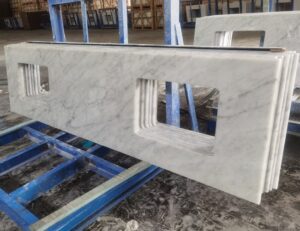The use of Carrara marble, which is recognized for its enduring beauty and classic elegance, has been a mainstay in the design of architectural and interior spaces for a very long time. On the other hand, there is a widespread misunderstanding concerning the propensity of this exquisite stone to become stained. Within the scope of this all-encompassing book, we delve deeply into the features of Carrara marble in order to reveal the truth about the stain resistance of this material. In order to offer you with a full explanation of whether or not Carrara marble is readily stained, we will investigate every facet of the material, beginning with its origins and continuing with its composition and the care requirements.

Carrara Marble’s Origins and Geological Composition is the Subject of the First Part
The province of Carrara in Tuscany, Italy, is the source of Carrara marble, which has been extracted from quarries for hundreds of years at that time. The metamorphism of limestone, which occurs when limestone is subjected to high pressure and temperature, results in the formation of a type of marble that is either white or blue-gray in color. In terms of its geological composition, Carrara marble is predominantly composed of calcite, dolomite, and several other mineral impurities. These impurities are responsible for the peculiar veining patterns and color variations that accompany this marble.
Understanding the Stain Resistance of Carrara Marble is the Topic of Part Two
It is a common misconception that Carrara marble is resistant to stains, but in reality, its stain resistance varies based on a number of characteristics, including its porosity, surface polish, and mineral makeup. Despite the fact that Carrara marble is typically more porous than granite or quartz, it does not have a natural tendency to fade or become stained. If the Carrara marble is not well maintained or if it is not properly sealed, then some substances, such as acidic meals, oils, and colored liquids, have the potential to infiltrate the surface of the marble.
Section III: Factors That Influence the Resistance to Stains
When we talk about the porosity of Carrara marble, we are referring to its capacity to take in liquids and retain stains. Although Carrara marble is not as dense as other varieties of marble, it is possible to reduce the inherent porosity of Carrara marble and improve its resistance to stains by the application of suitable sealing.
Surface Finish: The surface finish of Carrara marble, depending on whether it is polished, honed, or leathered, can have an effect on how easily it is stained. Polished surfaces have a smoother texture, which makes them more resistant to stains. On the other hand, honed or leathered finishes may require more frequent sealing in order to retain their stain resistance.
Sealing: For an additional layer of protection against stains and moisture penetration, sealing Carrara marble worktops and surfaces with an impregnating sealer of high quality might be an effective method. In order to achieve the best possible results, it is vital to adhere to the manufacturer’s recommendations regarding the frequency of sealing and the application techniques.

Fourth Section: Suggestions for Carrara Marble Maintenance
It is vital to do routine cleaning on Carrara marble surfaces using a gentle cleanser that is pH-neutral and a soft cloth or sponge. This is necessary in order to prevent the accumulation of dirt, grime, and stains within the marble.
Immediate Spill Cleanup: To prevent spills and stains from infiltrating the surface of Carrara marble countertops, it is important to immediately wipe them up with a moist cloth or sponge.
Avoid Harsh Chemicals: When working with Carrara marble, it is important to avoid using harsh chemicals, acidic substances, and abrasive cleansers. These can cause the surface to become dull or etched, and they can also weaken the marble’s ability to resist stains.
Periodic Sealing: To ensure excellent stain resistance and protection against moisture penetration, Carrara marble countertops should be reapplied with an impregnating sealer of high quality every six to twelve months, or as indicated by the manufacturer.

Part V: The Final Thoughts
The conclusion is that Carrara marble is an option that is both classic and sophisticated for use in interior surfaces such as countertops, backsplashes, and other areas. The stain resistance and lifetime of the material can be considerably improved with regular maintenance and sealing, despite the fact that it may exhibit a certain degree of porosity and be susceptible to staining. It is possible for homeowners and designers to appreciate the classic beauty of Carrara marble in their spaces for many years to come if they have a thorough awareness of the aspects that influence the stain resistance of Carrara marble and if they adhere to the best procedures for maintenance and restoration.






